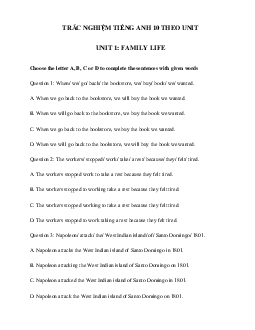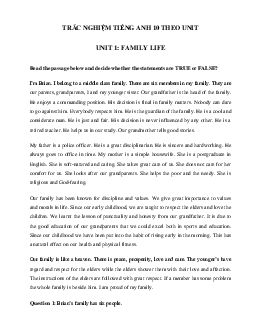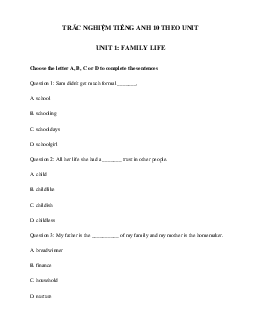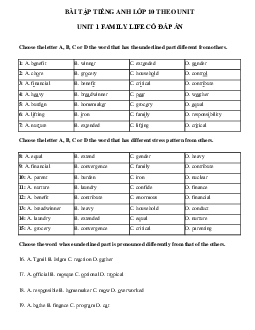



Preview text:
Soạn Unit 1 Lớp 10: Speaking trang 12 Bài 1
1. Below are reasons why children should or shouldn’t do housework. Put them
in the correct column. Add some more if you can.
(Dưới đây là những lý do tại sao trẻ em nên hoặc không nên làm việc nhà. Đặt các lí
do vào đúng cột. Thêm một số lí do nếu bạn có thể.)
1. Doing housework helps them develop life skills.
2. Doing housework teaches them to take responsibilities.
3. Kids should be given plenty of playtime when they are young.
4. They may break or damage things when doing housework.
5. Doing housework helps strengthen family bond.
6. They need more time to study and do homework. Should Shouldn’t
Doing housework helps them develop life skills. Gợi ý đáp án Should (Nên)
Shouldn’t (Không nên)
Doing housework helps them develop Kids should be given plenty of playtime life skills. when they are young.
Doing housework teaches them to take They may break or damage things when responsibilities. doing housework. Doing housework helps
strengthen They need more time to study and do family bond. homework. Bài 2
2. Work in pairs. Complete the conversation between Anna, Nam, and Minh
using some ideas from 1. Then listen to the conversation and check your answer.
(Làm việc theo cặp. Hoàn thành đoạn hội thoại giữa Anna, Nam và Minh bằng một số
ý từ bài 1. Sau đó, nghe đoạn hội thoại và kiểm tra câu trả lời của bạn.)
Anna: Nam, why do you think children should do housework?
Nam: Because (1) ___________.
Anna: It’s true. Life skills such as cooking, cleaning or taking care of others are really
necessary for kids when they grow up.
Nam: Yes, we should all have these basic life skills to be adults.
Anna: Now Minh, why do you think children shouldn’t do housework?
Minh: I think kids are kids. (2) ___________.
Nam: I don’t agree with you. I’m afraid too much playtime isn’t good for children.
Anna: Well, thank you both for sharing your ideas. They are very useful for my project. Tạm dịch:
Anna: Nam, tại sao bạn nghĩ trẻ em nên làm việc nhà?
Nam: Vì làm việc nhà giúp các em phát triển các kỹ năng sống.
Anna: Đó là sự thật. Các kỹ năng sống như nấu ăn, dọn dẹp hay chăm sóc người khác
thực sự cần thiết cho trẻ khi lớn lên.
Nam: Đúng vậy, tất cả chúng ta nên có những kỹ năng sống cơ bản này để trở thành người lớn.
Anna: Bây giờ Minh, tại sao bạn nghĩ trẻ em không nên làm việc nhà?
Minh: Mình nghĩ trẻ em là trẻ em. Các em nên được dành nhiều thời gian chơi khi chúng còn nhỏ.
Nam: Mình không đồng ý với cậu. Mình e rằng thời gian chơi quá nhiều sẽ không tốt cho trẻ em.
Anna: Được rồi, cảm ơn cả hai đã chia sẻ ý kiến của mình. Chúng rất hữu ích cho dự án của mình. Gợi ý đáp án Gợi ý đáp án
Anna: Nam, why do you think children should do housework?
(Nam, tại sao bạn nghĩ trẻ em nên làm việc nhà?)
Nam: Because (1) doing housework helps them develop life skills.
(Vì làm việc nhà giúp các em phát triển các kỹ năng sống.)
Anna: It’s true. Life skills such as cooking, cleaning or taking care of others are really
necessary for kids when they grow up.
(Điều đó đúng đấy. Các kỹ năng sống như nấu ăn, dọn dẹp hay chăm sóc người khác
thực sự cần thiết cho trẻ khi lớn lên.)
Nam: Yes, we should all have these basic life skills to be adults.
(Đúng vậy, tất cả chúng ta nên có những kỹ năng sống cơ bản này để trở thành người lớn.)
Anna: Now Minh, why do you think children shouldn’t do housework?
(Giờ thì Minh, tại sao bạn nghĩ trẻ em không nên làm việc nhà?)
Minh: I think kids are kids. (2) They may break or damage things when doing housework.
(Mình nghĩ trẻ em là trẻ em. Các em nên được dành nhiều thời gian chơi khi chúng còn nhỏ.)
Nam: I don’t agree with you. I’m afraid too much playtime isn’t good for children.
(Mình không đồng ý với cậu. Mình e rằng thời gian chơi quá nhiều sẽ không tốt cho trẻ em.)
Anna: Well, thank you both for sharing your ideas. They are very useful for my project.
(Được rồi, cảm ơn cả hai đã chia sẻ ý kiến của mình. Chúng rất hữu ích cho dự án của mình.) Bài 3
3. Work in groups. Have similar conversations exchanging opinions about
whether children should or shouldn’t do housework. You can use the ideas from 1 and the reading text.
(Làm việc nhóm. Thực hiện những cuộc trò chuyện tương tự để trao đổi ý kiến về việc
trẻ nên hay không nên làm việc nhà. Bạn có thể sử dụng các ý tưởng từ bài 1 và bài đọc ở trên.) Gợi ý đáp án
Anna: Nam, why do you think children should do housework?
Nam: Because doing housework teaches them to take responsibilities.
Anna: It’s true. Being responsible for the things we do is really necessary when we grow up.
Nam: Yes, we should all take responsibilities for everything from the smallest one.
Anna: Now Minh, why do you think children shouldn’t do housework?
Minh: I think kids are careless. They may break or damage things when doing housework.
Nam: I don’t agree with you. Some of the kids are even more careful than adults, for
example my three-year-old nephew.
Anna: Well, thank you both for sharing your ideas. They are very useful for my project.




